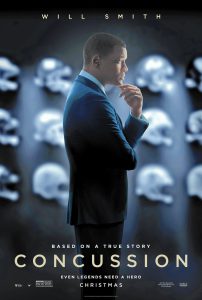Children, Go Where I Send Thee — with Home Free and Kenny Rogers
Posted on December 25, 2015 at 7:00 am
Posted on December 25, 2015 at 7:00 am
Posted on December 24, 2015 at 7:54 pm
C| Lowest Recommended Age: | Middle School |
| MPAA Rating: | Rated PG-13 for thematic material including some disturbing images, and language |
| Profanity: | Some strong language |
| Alcohol/ Drugs: | Alcohol and drug abuse |
| Violence/ Scariness: | Themes of severe brain trauma, dementia, substance abuse, domestic abuse, suicide |
| Diversity Issues: | Some bigotry and xenophobia |
| Date Released to Theaters: | December 25, 2015 |

Dr. Bennet Omalu (Will Smith) is a pathologist, an immigrant from Nigeria, with an assortment of degrees and certifications. He lives very quietly and is devoted to his work. When he is asked to perform an autopsy on former Pittsburgh Steelers four-ring center Mike Webster (David Morse), something does not seem right to him. His office will not authorize additional tests, so he pays for them himself: $20,000 to prepare very thin slices of Webster’s brain so that Omalu can figure out why a man who was just 50 had amnesia, depression, and dementia, with indications of brain damage normally not found until extreme old age or severe injury. The tests revealed a syndrome Omalu called CTE: chronic traumatic encephalopathy.
Omalu wanted to find out how pervasive this problem was among former professional football players. But there was a lot of money and a lot of power with no interest in finding out whether a game — no an industry — that “owns a day of the week” and employs tens of thousands of people might be so unsafe for its players that it put the future of professional football at risk.
He gets an ally in former NFL doctor Julian Bailes (Alec Baldwin). And while some of his colleagues consider him a troublemaker or even a traitor, his boss (Albert Brooks) is on his side.
Art didn’t imitate life, but it was most likely shaped by it. The 2014 Sony hack revealed memos that raised concerns from studio executives about the sensitivity of the subject matter and the response of the NFL. That may be why a film about integrity and courage pulls its punches. It ramps up the implications of pressure, unpersuasively attempting to tie unrelated professional and personal setbacks to the NFL. A climactic job offer does not have the meaning that the film attempts to assign to it. Gugu Mbatha-Raw is sadly underused as the loyal spouse. And Smith himself is underused with a one-note performance that makes Omalu a cardboard figure. A movie about courage shows very little of its own.
NOTE: Slate’s Daniel Engbar contradicts some of the allegations in the film. The week of the film’s release, the NFL pulled its funding from an independent research project about the link between professional football and brain injuries.
Parents should know that this story concerns severe traumatic brain injury from professional sports with catastrophic consequences including dementia, substance abuse, domestic abuse, and suicide, as well as the obstructionist efforts by the authorities to deny the injuries, some strong language.
Family discussion: Why did Bennet Omalu pay for the additional tests? Why didn’t the NFL do more to protect its players? Who is most like Dr. Omalu in your life?
If you like this, try: “The Pursuit of Happyness”
Posted on December 24, 2015 at 6:00 pm
This adorable Nativity play is endearingly natural and the enjoyment we see in Bing Crosby and Ingrid Bergman seems entirely authentic. The play’s dialogue was indeed made up by the children themselves, with the lead played by the son of the film’s musical director, not an actor.